First of all, please tell the readers briefly who you are and what you do for a living.
J A geek’s dream job, you could say!
E I’m Erica Olson Jeffrey. I’m an American who majored in English and minored in International Relations, whatever that actually means. I’m an editor/translator/writer, part-time college professor, part-time jewellery maker, weekend farmer, sharing-economy host, and voracious reader. I’m the gig economy in a nutshell.
Cinebook is a British-based publishing company, so does that mean you both live in the UK?
J Neither of us, actually! When I started at Cinebook, I was living in Ireland, the Republic thereof. Since then I’ve moved back to France and have been living in Tours for the past 7 years.
E I’m in the US, although when I visited Iceland a couple of years ago, I wanted to move there for six months. Same with Ireland. (Jerome beat me there.)
What are your earliest memories of comics and cartoons, and what were your particular favourites?
J I was a kid – I dunno, four or five. My father had a lot of French bandes dessinées already, and one day I opened the old cabinet in which they were kept and started reading. My first books were most likely – ironically – Mickey stuff. Once I started digging into proper BDs, I tried Tintin, Asterix, Lucky Luke … The usual suspects for a French kid. My favourites? Asterix was always fun, but I quickly settled on a trio of must-read series: Yoko Tsuno, Valerian and Laureline, as well as the so far untranslated Achille Talon, for the sheer amount of verbosity Greg managed to fit into his stories!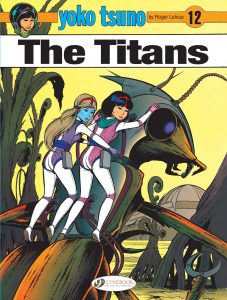
E My earliest memories are of Sunday newspaper comics – old, old series like Peanuts. Then came Archie, Superman, Wonder Woman, and all the Peanuts books. Later I read my kids countless Calvin & Hobbes collections. Most unforgettable storyline: Lois Lane drinks a potion that causes her to be constantly parched, needing to drink any liquid she can get her hands on. I vividly remember her drinking ink. It turned out that the antidote she needed was water. To be honest, I was a single-panel or strip lover… political cartoons, Sunday comics format, Far Side.
Were you always destined to work in the industry or is it more a case that you stumbled into it?
J I suppose I always dreamed – in a vague way, not one of those laser-focused life goals – that I might work in comics one day, but I was always abysmally bad at drawing, and early on the notion of being a scriptwriter didn’t really register. Much later, I contacted Cinebook as a reader, to ask a question about one of their books – and as an afterthought mentioned that I could do some translation work for them if they needed. The timing was right, and I was hired. I’ve been combining two passions ever since!
Luck’s a funny old thing.
E I LOVE how I came to work in this industry. I’ve been a writer and editor for many years. I was writing about printed circuit boards and the global electronics industry for a business formerly owned by Olivier Cadic when he sold the business and asked me to join him in marketing translated Franco-Belgian BDs in the English-speaking world. Talk about opposite ends of the spectrum! I said I didn’t know anything about BDs and Olivier replied, “I trust you.” In fact, I began to study French seriously because of Olivier’s former company. Near the end of my time there, I was the only American on the team, and I worried that everyone else was tired of speaking English on my behalf. I’ve known Olivier and Valérie for years, and they’re two of the hardest working people (with the loftiest goals) I know.
I have to tell you: the first comics trade show I worked for Cinebook was a huge one in New York City. I held down our booth on my own dressed in my nice little suit, very appropriate for a publishing tradeshow. Across from me were sexy pirate wenches posing for pictures. I felt overdressed and underprepared.
What was the first book you translated, and how did you find the experience?
J Yoko Tsuno – The Prey and the Ghost. I was lucky – again! – in that my first job was one of my favourite books from childhood. It’s a big plus, an added incentive to excel. As if the prospect of getting the job wasn’t a pretty big incentive in and of itself!
It was both a blast, and a terrifying experience. A blast because, well, I love translation, and see above about ‘favourite book’. Terrifying because I was still fairly green at the time, didn’t know what to expect from Cinebook, didn’t want to let Yoko or Roger Leloup (the author) down.
Fortunately, the whole team at Cinebook turned out to be awesome (especially my long-suffering editor – hi Erica!), and, as it happens, comics are just the format that suits my own skills.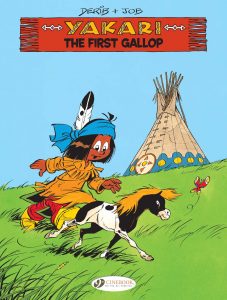
E Yakari and Great Eagle, for early readers. That was a good match for my limited skills. I moved on to Lucky Luke and generally stuck with all-ages volumes. I also edited the translations of all the titles and eventually realised it was much more time-efficient for me to stick to editing. Jerome came along and blew me out of the water with his facility for English idioms, anyway. Even though Yakari didn’t have a lot of words compared with Yoko Tsuno, for instance, there was still plenty of scope for me to mess up. I went back and fixed some so-so translating in the second edition.
Can you share how the translating process works, and the timescales involved?
J First I get a PDF of the comic – early on I occasionally worked from the physical books, but there were a couple of times where the printed version had been corrected afterwards and that caused discrepancies. I translate the full text, then it goes to Erica, who I suspect pulls her hair out for a while before correcting my mistakes and suggesting possible changes or alternative takes. It’s a true team effort, with several other people involved in the quality control all the way to the printers.
Timewise, it takes me around a week on average to do the first translation – less for Yakari, twice as long for Blake & Mortimer, for example. I’ll let Erica speak for her side of things, but when you add up the time spent on the various stages of translation, editing and verification, I’d say it comes to three or four weeks per book.
E That sounds about right. I think all of us on the team have hair-pulling moments because we’re not just translating. We’re interpreting, looking for idioms and jokes that work in English, struggling (but it’s a fun struggle) to adjust ideas that don’t necessarily translate well – not just words but cultural norms, etc, as well as language and stereotypes from years ago that are no longer acceptable in many cultures. Jerome is a master at translating puns, by the way. I really struggled with that with the Iznogoud series. I’m also such an editor… I get stuck in that mode, missing the forest for the trees sometimes, questioning something Jerome has written, and he has to remind me that it’s supposed to be a joke. Teehee.
One of the writers you’ve had cause to translate into English is the redoubtable René Goscinny. What challenges do you face translating a writer who is so gifted at humour and word play?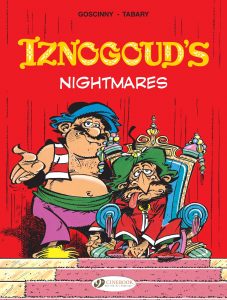
J Ohhhh boy … Translating his wordplay is complicated, to say the least! In a comic such as Iznogoud, for example, where every name is a pun, where a sizeable part of the dialogue is a pun, when the entire story might be a pun … You do what you can. You find a pun that works. Sometimes it’s an exact equivalent, sometimes you work around it. And then, occasionally, you just can’t do it. When that happens, you hang your head in shame and move on. Then, on occasion, you suddenly think of a pun in English that wasn’t in the French version, and you ‘compensate’ by including it in the story!
At the same time, though, Goscinny’s non-pun based humour is actually easier to translate – at least, I think so. The man knew how to construct a story with such elegance that everything flows effortlessly. It’s all perfectly natural. Translating Goscinny is a genuine pleasure.
It is also a terrifying prospect because you’re fiddling with the words of a bona fide genius, and because you’re coming after a legendary team in the business: Anthea Bell and Derek Hockridge. That’s a sobering thought.
E What he said.
You’ve already translated a tremendous back catalogue of Franco-Belgian work, some of which stretches back to 1949. Are there additional problems translating older books for a contemporary audience?
J Oh, yes! How much should the language be ‘modernised’, for example. Without going as far as including emojis or text-speech, perhaps some expressions that were all the rage in the 50s in French shouldn’t be translated to their equivalent at the time in England or the USA, but rather something more neutral should be used! Unless, of course, the time period is central to the story, in which case the difficulty becomes recognising the French terms and finding out their English equivalent – it’s amazing how unfamiliar I am with 50s slang! Add to that historical details to be checked, and sometimes properly identifying the tone of an older story…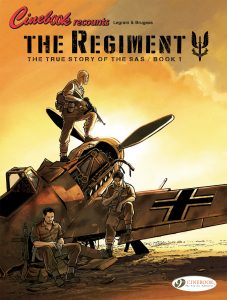
E We are such NERDS! We say this all the time, and I think we’re bragging when we say it. We spend an inordinate amount of time, between us, looking up details. I grew up in US Midwest, home to cowboy culture, so I love adding to my knowledge of old terms and nicknames. Jerome is an ace at military insignia, ranks and armaments.
What books gave you the most pleasure to work on, and why?
J Yoko Tsuno and Valerian are old friends I’m honoured to work with, every time. Long John Silver was exhilarating – 18th century vocabulary, pirates, ships and hidden treasures, and Crom, Lauffray’s art! There have been a few I had a blast working on. The latest was The Regiment, the story of the SAS during WWII – a combination of gorgeous art, extremely well researched historical details and a gripping story. I can’t tell you how much I loved working on this one!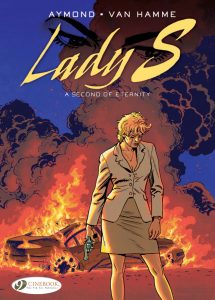
E Well, first, Lucky Luke. So fun, so silly, largely kid-friendly, with enough history thrown in that I occasionally say, “Um… this didn’t actually happen this way. I grew up near there, and I can tell you that blah blah blah.” I also enjoy Lady S. because – hello – female spy in a black catsuit.
Does translation ever go wrong?
J Well, it never explodes … If you mean do we ever make mistakes, ah, yes, unfortunately. We’re only human, and we occasionally goof up. I goof up, I should say! I don’t recall any massive mistakes making it past our control procedure, but there were a couple of instances of American English making their way into the oh so British Blake & Mortimer, for example. Stuff like that. We’ve never altered a story entirely by mistranslating a sentence, though.
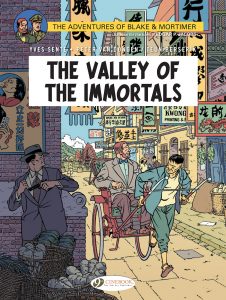 E The most serious criticism I’ve encountered has been that someone was upset we’d “censored” an image by changing it. But, let’s be honest: some countries won’t allow certain images in books, and is it more important to show some skin than to share these stories? Or, does it ruin the story if an adult doesn’t swear in a book for young children? No, it doesn’t. It’s not censorship so much as adaptation, in my eyes.
E The most serious criticism I’ve encountered has been that someone was upset we’d “censored” an image by changing it. But, let’s be honest: some countries won’t allow certain images in books, and is it more important to show some skin than to share these stories? Or, does it ruin the story if an adult doesn’t swear in a book for young children? No, it doesn’t. It’s not censorship so much as adaptation, in my eyes.
J Oh dear … The censorship thing. I forgot about that. It’s not really part of the ‘translation’ per se, of course, but, yeah, that’s been levelled at us quite a few times. Most often just in grumbling tones – which I completely understand and actually share, but, like Erica said, what can you do? We sell worldwide. No localised version for this or that country. Adding a bra or a few folds of bed sheets to an image to salvage a lady’s (it’s usually ladies, innit?) modesty allows us to make available stories that haven’t otherwise been translated in decades, or even at all. Small, if irritating, price to pay.
Unfortunately, there have been some absolutely rabid critics of this editorial decision – the kind whose rhetoric on the subject sounded like we’d personally murdered their dog when we covered a single breast in a 46-page comic. You know – the sort of toxic fans who’d pan Captain Marvel before it’s even out on anti-feminist principles, etc … I have to say, being a geek/nerd in this day and age is a sometimes bitter experience, when I see how low some people will stoop in the name of their fandom.
Have you been surprised by how well Cinebook has been received in the UK and beyond?
J A part of me is happily surprised, as I long believed that European comics were apparently doomed to never even make an appearance away from the continent. It’s great to see people getting interested in comics I’ve loved since I was a kid and longed to share. And it’s gratifying to hear so much good things about our work.
I do regret the English-speaking public is still not seeing Franco-Belgian comics as a mainstream form of entertainment.
An author like Franquin should be as well-known worldwide as a Charles Schultz or a Bill Watterson! And yet … We’ll keep at it!
E Remember how Olivier said “I trust you” when he asked me to join this team? I joined in no small measure because I trusted him when he said there was an untapped Anglophone market for series like Lucky Luke and Blake & Mortimer.
Is the comic industry still thriving in France and Belgium or is it feeling the pressure of the internet?
J The French-speaking comic industry has its own set of problems – a bad case of overproduction, the frighteningly precarious living conditions of many young authors who don’t make a living wage – but as far as I know, internet hasn’t been the enemy so far. We love books in France – the physical thing. We love holding it, even young people. A slight readjustment of market shares was probably necessary, but I don’t think it threatened printed books much. That said, I can’t say for sure.
E Jerome knows better than I, but it’s enlightening to walk along the Seine on a weekend and pass bookstalls with crowds of adults around them, picking up comic books.
If you could bring any one single series to an English reading audience that hasn’t yet been translated what would it be? What are we missing out on?
J There’s a bunch I’d love to do. Soda is a modern crime story about a hard-boiled, cynical New York cop who pretends to work as a pastor for his weak-hearted mother’s benefit – I’ve always loved the dark humour there.
Then there is De Cape et de Croc, a fantastic story of two swashbuckling gentlemen in 17th century France who also happen to be a fox and a wolf. It mixes Molière, Cyrano and the fables of La Fontaine, the heroes fight while improvising poetry, they go to the moon … It’s gorgeous and hilarious and such wonderful language …
I might push for Soda, actually. The translating job seems less scary!!
Are there any English-language comics, graphic novels or cartoon strips that you’ve come across that you’d like to see shared with a Franco-Belgian audience?
J It’s been a while since I’ve read a comic in English that hasn’t already been translated, actually. I suppose one of my favourites is The Order of the Stick, a webcomic based on Dungeons and Dragons and drawn in a remarkably complex and expressive stick figure style – one of the few styles I’ve never really seen used in French comics!
E I’m knee-deep in college compositions right now, and I’d love to share them with a bilingual Franco-Belgian audience who could help me grade them. Jerome?
J Not even in my worst nightmares! It has been demonstrated that teaching – and especially grading – is not for me!
What do you do to relax when you’re not working?
J If I’m not reading or binging some TV series, then I’m probably conquering/saving the world on my computer. Hello, my name is Jerome and I’m a gaming addict … Not entirely a joke, by the way – it’s been borderline here and there. I’ve managed to transfer some of my taste to board games in the last few years – better for the eyes, gets you out of the house and you see real people!
E I relax with my family, read, travel, brush up on languages or learn pieces of new ones before going to another country, make jewellery, watch our chickens take dust baths, work in the garden… I love games – not gaming games, like Jerome, but tennis, pickle ball, board games, word games… I don’t have to win, but I like to play well.
Um, I can’t believe Jerome didn’t mention cosplay.
Oh, and I bicycled across parts of Vietnam last summer!
J Well … Cosplay’s not really something I do to relax, as such. It’s a lot of fun, but it’s also a lot of work – and for me it doesn’t happen very often. As for travelling, I love it, too, but a trip to a foreign country is always anything but relaxing – gotta see EVERYTHING while I’m there!
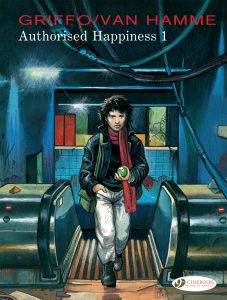 Are there any upcoming titles we can look forward to from Cinebook or is it all hush-hush?
Are there any upcoming titles we can look forward to from Cinebook or is it all hush-hush?
J I already mentioned The Regiment. It’s out in digital format, through our partnership with Europe Comics for now. It’ll be out in print in September. Authorised Happiness is an upcoming series about a dystopian future (as seen in the 80s, so perhaps a ‘dystopian alternate present’ would be a better description) that’s both smart and captivating. Same thing – out in digital format, in print late this year, or early next year, I believe.
And we’re finally bringing out a Collected Lucky Luke in hardback format, after the success of Valerian! Beyond that, I can’t give names yet, but we do have several new series lined up, and we’re evaluating the next batch as I write.
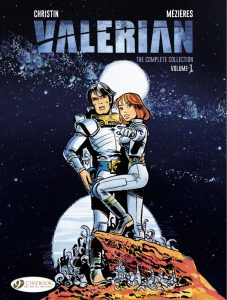 If each of you were to recommend one Cinebook title to our readers, which one would it be, and why?
If each of you were to recommend one Cinebook title to our readers, which one would it be, and why?
J Valerian & Laureline. If I have only one to recommend, then this one, because it’s got everything: brains, brawn and beauty! It’s smart sci-fi, both in themes and in stories. It’s full of fun, madcap adventures through space and time. And it’s got one of the most iconic characters ever to grace comic book pages: Laureline. It’s seminal work, but it’s also highly enjoyable.
E That’s a tough one. I have to circle back to Lucky Luke. I still laugh out loud at parts. The real-life Luke would have a twinkle in his eye that I’d find irresistible.
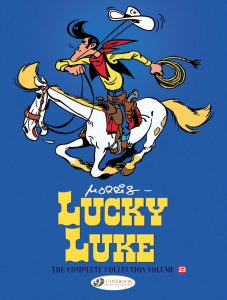
Is there anything you’d like to add about you or your work?
E An English degree is an extremely versatile degree. I’ve translated comics, written about PCBs while traveling the world, edited hundreds of books, published a book of short stories, taught college students, worked for a lobbyist. If you’re not going to go for engineering, where the real money is, consider an English degree. It brought the Cinebook family into my life.
This interview first appeared in JESTER 529.
You can discover all of Cinebook’s titles at www.cinebook.com



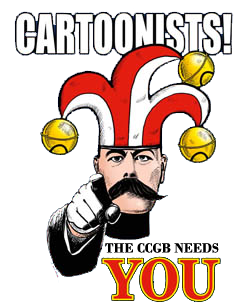
While I understand the need to get the books out there when it comes to censorship, I would say that equating those who are against it (like myself for example) to those who pan a movie like Captain Marvel before it comes out is troubling to read. My concern with “adding a fold to a sheet or covering a breast in one image out of a 46-page comic” is that at the end of the day, it’s altering a creators vision of the story. I am currently reading (and loving) the series THORGAL and while it doesn’t take me out of the story, it bothers me that this work has been altered by someone who was not the creator
A bit (!) late in responding, sorry, but I’d like to point out a couple of things:
– All of the modifications done on our books are done with the approval of the rights owners. The artists themselves when they’re still alive, their heirs if they aren’t. In some cases (though I don’t know which ones) it’s even done BY the artist himself. We NEVER modify without consent.
– Re-read that line. I equate the RABID complainers to the toxic fans who panned Captain Marvel before seeing it. Certainly not everyone who is against censorship. In fact, I also state that I completely understand – and even agree with them, at least to a certain degree.
It’s just that some people were utterly irrational about it.